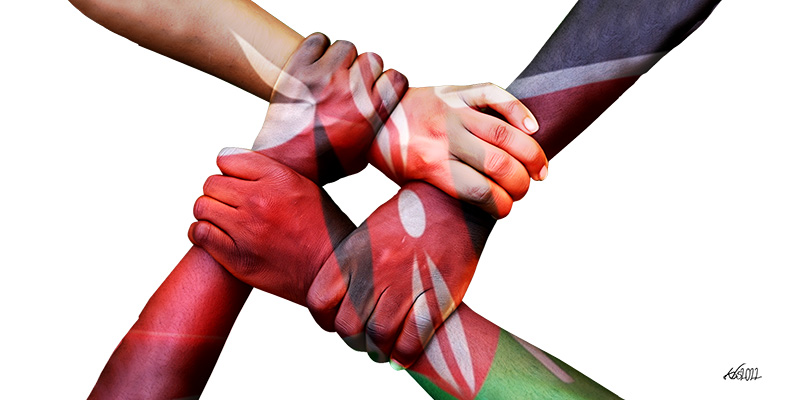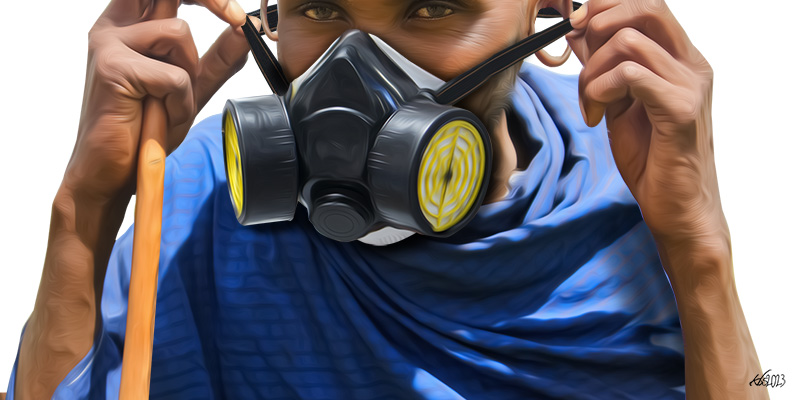Facing a withering assault over his relationship with his Deputy William Ruto, President Uhuru Kenyatta delivered a measured and thoughtful speech on Kenyan ethnic politics. During the burial of the mother of Hon. Musalia Mudavadi, leader of the Amani National Congress, Kenyatta proclaimed, “two tribes only should not lead this country”. His assertion was by almost every measure extraordinary. Or, perhaps, delivered against the advice of his advisors, who felt that rekindling discussion of the tribalized presidency would roil the usual negative public debate.
Uhuru did not gauge the language of his speech, nor was it shaped by his political handlers. Yet he set the tone for the 2022 presidential elections.
Just like Gandalf the White, in JRR Tolkien’s Return of the King, whose simple word freed King Theoden from an enchantment placed on him by Saruman through Wormtongue, with this pronouncement, Uhuru sought to exorcise the spell that has bound Kenya since independence: politicized ethnicity.
In a cruel irony, having benefited from tribalized politics, Uhuru would now purport to jettison it. His father, President Jomo Kenyatta, spawned the tribal logic that shaped Kenyan post-independence politics. By creating the Gikuyu Embu Meru Association (GEMA), he not only decimated a budding ideology-based party politics but, without shame, also anchored tribalized politics to win the 1969 General elections. Kenyatta commissioned the ominous Gikuyu Oath to galvanize support around his presidency. Rev. John Gatu, former moderator of the Presbyterian Church of East Africa (PCEA), maintains that Kenyatta administered the oath to solidify tribal unity, besides ensuring that the presidency stayed in the house of Mumbi. Thus, Kenyatta created a super-majority for the political security of his ethnic kin. This approach was not unique to Kenyatta since, according to Prof. James Ogude, from 1963, parties mobilized political support along ethnic lines. These political parties articulated the communal and politicians’ interests, conflating personal with ethnic interests and thus widening social and political schisms.
In employing the colonial script of indirect rule, Jomo Kenyatta made Kenyans outside GEMA what Prof. Mahmood Mamdani, in Neither Settler nor Native, calls permanent minorities. They became tribal outfits and so excluded them from power and state resources. In this act, Kenyatta proffered to his community a distinct advantage in electoral politics, which they continued to enjoy, boasting of the tyranny of numbers.
By adopting a majoritarian democracy, the nation established Kenyan power through political units based on population sizes. Jomo led the nation along lines of cultural and ethnic distinction, politicizing ethnic groups into administrative-political units or tribes. This justified skewed political representation with minority groups not having a single representative at any level of governance, while the dominant had several. This divergence is based on skewed electoral boundary demarcations and the extent of concentrating ethnic groups within political units. The institutions given the authority to create boundaries have often done so, intending to make sure that they dispersed other communities across various political units, thus ensuring minorities were permanent.
President Daniel arap Moi, Kenya’s second president, emulated Kenyatta’s tribal policies. His slogan, siasa mbaya, maisha mbaya (dirty politics, terrible life), epitomized his tribalized political agenda. Moi created his new minorities on a territorial and political basis, which he executed in two ways.
First, Moi capitalized on colonial territorial boundaries, which had become the basis for post-colonial conflicts, as the grounds for political belonging. Moi did not invent differences between ethnic groups, but exploited them. He copied the British tactics. The British, Mamdani argues, politicized real and acknowledged differences between ethnic groups by turning them into legal boundaries deemed inviolable and basing security and economic benefits on locals’ respect for these boundaries.
But not having a large ethnic bloc like GEMA, Moi aped the British. He identified distinctive local customs and histories and perpetuated the imperial historical narrative, census, and law, thus transforming existing cultural differences into boundaries of political identity. Moi amalgamated smaller tribes into a dreaded political juggernaut, the KAMATUSA acronym for Kalenjin, Maasai, Turkana, and Samburu, earmarking the Rift Valley Province as their homeland. In this homeland, they made other communities permanent minorities irrespective of their number. It was, therefore, possible for him to govern the fragmented and fractured large groups, such as the Luo and the Kikuyu.
Moi capitalized on colonial territorial boundaries, which had become the basis for post-colonial conflicts, as the grounds for political belonging.
At the risk of violence, the state and Moi’s supporters further suppressed the minorities’ right to political opinion. Moi’s supporters, including Willy Kamuren, Baringo North KANU MP (1988-1992), declared, “[That] the Kalenjin, Maasai, Samburu, and West Pokot . . . were ready to protect the Government ‘using any weapon at their disposal’”. He warned, “If any FORD member dared to visit any part of the province, they will regret it for the rest of their lives.” But it was William Ole Ntimama, the then MP for Narok North and Minister for Local Government (1988-1992) who epitomized violence against minorities when he vowed, “We will use rungus if this will be the effective way of ending the talk about multi-party. This I have said on this platform and am repeating it: The violence of Saba Saba was not a milk-drinking party”. In early 1993, tribal clashes broke out in Enoosupukia—which is in Maasailand—between the Maasai and the Kikuyu).
For Moi’s supporters, any call for multi-parties and inclusive government met with calls for Majimboism. (Majimbo, Kiswahili for provinces/states, was a federal system of governing espoused in independent Kenya. The self-government and independence constitutions introduced in 1963 provided some significant characteristics of federalism, but the regionalism created under those constitutions fell short of a full federal system of governance.) Consider the boldness of Willy Kamuren, the Baringo North KANU MP (1988-1992), demanding that they “. . . keep quiet or else we’re ready for the introduction of Majimboism whereby every person will be required to go back to his motherland. Once we introduce Majimbo in Rift Valley, all outsiders who acquired our land will have to move and then leave the land to our children”.
Second, the Moi era re-defined permanent minorities via the prism of political power access. Moi made permanent minorities of the ethnic groups he excluded from power, thus justifying denying them access to economic progress. Their citizenship meant little as long as it precluded them from sovereign power.
Following the 1982 failed coup d’état against his government, Jennifer A. Widner observed that Moi radically altered the composition of key cabinet positions in 1985 and filled them with members of the Kalenjin and smaller communities. Moi’s government policies empowered these native authorities, bestowing benefits and generating higher investment in the homeland, while stunting the rest of the country. In this arrangement, the minorities have suffered most from such dynamic exclusion. Hassan J. Ndzovu noted that the government excluded entire regions from the benefits of state-sanctioned development, since it targeted specific communities for discrimination. This resulted in unbridgeable societal inequalities. Such inequalities violated basic human rights. The Swedish academic and Cambridge don Göran Therborn defines inequality as “a historical social construction which allocates the possibilities of realizing human capacity unequally”. According to Therborn, inequality kills. Inequality puts people asunder and tears families apart. It creates exorbitant squandering, self-indulgent profligacy, and other evils.
Of significance, inequality is a denial of the possibility for everybody’s human capabilities to develop. Therborn further enumerated the effects of inequalities to include premature death, ill health, humiliation, subjection, discrimination, exclusion from knowledge or mainstream social life, poverty, powerlessness, stress, insecurity, anxiety, lack of self-confidence and pride in oneself, and exclusion from opportunities and life-chances. While in Kenya Minorities, Indigenous Peoples and Ethnic Diversity, Maurice O. MakOloo observes how many citizens, especially from minority groups, view the state as accessible to only those with strong ethnic affiliations with holders of political power, or economic might. It is disgraceful that Kenya’s post-independent governments institutionalized inequalities among its citizens through ethnic politics.
Appalled at the failure of governments to fulfil their social obligations to the citizenry, distraught Kenyans turned to civil society to agitate for law reforms. They sought laws to restrain the leaders’ inexcusable excesses. Ethnic politics has harmed our society. Such persistent inequality failed the national socio-economic development project. The exacerbation of exclusion and marginalization yielded systemic corruption, nepotism, and discrimination, which came to the fore during Moi’s regime.
Inequality puts people asunder and tears families apart. It creates exorbitant squandering, self-indulgent profligacy, and other evils.
Amid this encircling gloom, we saw a new constitution as a social contract between the people and their rulers. These were the explicit or implicit agreements among the members of a society to cooperate for social benefits, by sacrificing certain individual freedoms for state protection. Such was the Constitution 2010, which Kenya’s former Chief Justice Willy Mutunga maintains reflected the struggles of the people and provided foundations of a renewed hope. It thus allowed people to expect them to keep their promises, cooperate, and so on. Before establishing the basic social contract, nothing was immoral or unjust anything goes. Mutunga states: “In their wisdom, the Kenyan people decreed that past to reflect a status quo that was unacceptable”. For Mutunga, a modern Bill of Rights provided for economic, social, and cultural rights to reinforce the political and civil rights, giving the whole gamut of human rights the power to radically mitigate the status quo and signal the creation of a human rights state in Kenya.
This Constitution gave the ultimate authority to the people of Kenya, which they delegated to institutions. In return, the institutions must serve them and not enslave them. It sought to set up a framework to organize the operations of political parties and transform them into effective agents of democracy, national development, and national cohesion.
Kenya has since experimented with this new social order. By law, political parties were to have a national character and draw their members from across the country. Besides, they had to espouse a national agenda and thus promote national unity. Regrettably, ethnic politics remained weaved into political parties, with our law impotent and unable to solve inequalities and exclusion.
In 2013, for example, the two main political blocs had no presence outside the home region of their principal leaders. For instance, the Orange Democratic Movement (ODM) of Raila Odinga has Luo Nyanza as its bedrock of support, while the Ford Kenya of Moses Wetangula is in practice a Bukusu-Luhya party. The Wiper Democratic Movement, led by Kalonzo Musyoka, draws its numeric strength from the Kamba people in the lower Eastern. Meanwhile, The National Alliance (TNA) of President Uhuru Kenyatta was a Kikuyu party, even though some of its leaders were from other regions. The United Republican Party (URP) of the Deputy President William Ruto drew its membership strength from the Kalenjin communities.
Here is an irony. The parties that formed coalitions and alliances did so to aid their respective leaders to accede to political power as an end. The articulation of ethnic interests meant little. These groups were a mere voting bloc whose leaders remained unaccountable.
The 2017 elections had a different format. The political parties formed coalitions, providing a key impetus to unite their ethnic groups. For example, NASA comprised of ODM, Ford-Kenya, and Wiper party, was an alliance of the Luo, Luhya and Kamba ethnic groups associated with the individual parties in the alliance. Similarly, the Jubilee Alliance represented the GEMA, the Kalenjin, and other groups in the Rift Valley.
The exacerbation of exclusion and marginalization yielded systemic corruption, nepotism, and discrimination, which came to the fore during Moi’s regime.
They formed these coalitions of convenience with the sole motivation of gaining a parliamentary majority. Political parties have continued to represent ethno-regional interests. We appear paralyzed by the “tribal logic” at the crossroads of either facing chaos or forming a community. Thus, again sinking the desired changes into the deep trenches of ethnic politics.
I fear that politics will continue to disappoint our expectations. There will be a rising tide of anger and resentment. The majority of Kenyans will feel anxious, uncertain, fearful, aggressive, unstable, unrooted, and unloved. In the meantime, our leaders will focus on promoting themselves instead of the one thing that will give them lasting happiness, making life better for others.
Perhaps, this explains Uhuru’s intervention upon seeing the trajectory of the 2022 elections. In his statement, Uhuru appears to recognize the imperative of eliminating tribalism. He spoke with the urgency of one determined to rise above these divisions. One is ready to repair the cords that bind the nation. To him, this is the time. But we do not seem to be there yet!
Take the case of Hon. Ruto, leader of the United Democratic Alliance (UDA) and his Kenya Kwanza alliance. He tried to change the debate on tribalism, which he saw unravelling his ambition, and make the election about economic inequalities of the haves vs the have-nots. Ruto campaigned for a change in the fortunes of those struggling at the base of the economy, arguing that it was a prerequisite for peace. He hoped this focus would erase the impact of inequalities among Kenyans. But the UDA party ought to be cognizant that focusing on the market economy will foster inequalities and fester corruption. The market proffers capitalism. And capitalism seeks to build a happy society based on the exploitation of man by man.
On the opposing side is Hon. Raila Odinga’s Azimio la Umoja-One-Kenya. The alliance promises to unite Kenyans by including every ethnic group ready to join with them to achieve inclusion and prosperity for all Kenyans. This is their antidote to tribal politics but, on the contrary, pundits have deemed the alliance as an aggregate of tribal kings and queens. There has been limited discussion about Kenya within the parties, yet where mentioned, it is to make it easy to get political power in the interests of their leaders in the guise of the allied communities. Ethnic considerations are the basis for negotiating positions in government. Hence, the whispers within Azimio that Akamba people are negotiating for 20 per cent of the government.
Regrettably, ethnic politics remained weaved into political parties, with our law impotent and unable to solve inequalities and exclusion.
Driven by such strategic considerations, these alliances extensively use “ethnic arithmetic”, which tries to include as many groups as necessary to secure electoral victory. Overall, these types of ethnic coalitions prove to be internally fragile and short-lived. The two basic differences between the two multi-ethnic types are their respective motivation and internal stability: The alliance type corresponds to the logic of Donald Horowitz’s coalitions of convenience and coalitions of commitment. But these parties continue to manifest as a multi-ethnic alliance and multi-ethnic integrative parties, both of which, representing various ethnic communities, have widened the existing divisions.
Whatever form political parties take, the 2022 alliances—Kenya kwanza and Azimio—should desist from creating their minorities like previous governments. In both movements, the internal party discussions centre on “us versus them”. Party supporters prefer the local leaders they can trust to articulate their interests. Many people seek to join the winning team for fear of exclusion. It should not be that way.
Re-imagining a moral Kenya
Attempts to strengthen our institutions by creating institutions that offer democratic checks and balances, decreeing values in public service, have collapsed. The Constitution 2010, despite its inclusive and democratic laws, did not translate this promise into the life of the nation. Our leaders remain in breach of the social contract, and that, with impunity. Exclusion and inequalities continue to define our society.
For many Kenyans, the greatest sense of belonging and security derives not from the state but from the mediation of ethnic networks. If we are to turn things around in our society, we should heed the advice of Rabbi Jonathan Sacks. In his book The home we build together: Recreating Society, Sacks suggests that a society should develop on ideals such as justice, compassion, human dignity, welfare, relations between employer and employee, the equitable distribution of wealth, and the social inclusion of those without power (widows, orphans, strangers). Sacks maintains, “To these issues, a social contract is irrelevant. What matters is a social covenant”.
This requires a distinctive logic. Market economics and liberal democratic politics alone cannot sustain societal cohesion.
The market has been merciless. Politics are deceiving, divisive, confrontational, and extreme. Organizing our nation around the state (power) and market (economy) breeds inequalities and exclusion. In his book Morality, Sacks advances the third element for building a society: morality. Morality humanizes the competition for wealth and power. It is the redemption of our solitude. Sacks contends that morality gives us a concern for the welfare of others, an active commitment to justice and compassion, and a willingness to ask not just what is good for me but what is good for “all of us together”. We cannot outsource this aspect, however important to the market and the state.
We appear paralyzed by the “tribal logic” at the crossroads of either facing chaos or forming a community.
A society is a moral achievement, which we form through our habits. Sacks admonishes that we must cultivate self-restraint, develop a capacity to defer the gratification of instinct, and grow the habits of heart and virtues, without which we disintegrate.
State formation is not the real challenge facing democracies. Our challenge, observed Sacks, “[is] not about power but about culture, morality, social cohesion, about the subtle ties that bind, or fail to bind, us into a collective entity with a sense of shared responsibility and destiny.” Morality depends on each of us.
President Julius Nyerere of Tanzania, in his Ujamaa ideology, articulated what Sacks proffers as a moral society. Prof. Aloo Mojola of St. Paul’s University observes that Nyerere was dealing with inequalities, which in his judgment undermined mutual respect and humane relationships and destroyed the values and infrastructure necessary for a fair and egalitarian society. Central to Nyerere’s value of human brotherhood, according to Mojola, was his firm belief in Ubuntu, the equivalent of the Swahili term Utu.
This Nyerere defined thus: “Man is the purpose of all social activity. The service of man, the furtherance of human development, is, in fact, the purpose of society itself”. To emphasize Ubuntu’s importance, Desmond Tutu writes:
Ubuntu is the essence of being human. It speaks of how my humanity is caught up and bound up inextricably with yours . . . We are made for complementarity . . . Ubuntu speaks of spiritual attributes such as generosity, hospitality, compassion, caring, and sharing . . . The concept states that people are more important than profits.
Nyerere based his Ujamaa philosophy on communitarian thinking espoused in Africa’s extended families. He protracted this communitarian thinking beyond the circle of ethnic groups to include all humanity. His idea is that all humans should see each other as members of the same family. Nyerere stated, “As members of the ever-extending family . . . Bin adamu wote ni ndugu zangu, na Afrika ni moja,” All humans are my brothers and sisters, and Africa is one. In most African traditional heritage, the “society” extended the basic family unit. On extended family, Nyerere contends:
It can no longer confine the idea of the social family within the limits of the tribe, nor indeed of the nation. . . Our recognition of the family to which we all belong must be extended yet further– beyond the tribe, the community, the nation, or even the continent – to embrace the whole society of mankind.
Prof. Mojola maintains that the Arusha Declaration (Azimio la Arusha) is central to understanding Nyerere’s agenda. Thus Nyerere explained, “The Declaration is about the way we shall make a reality of human equality in this country, and how our citizens will achieve full control over their affairs”. Nyerere interpreted the Azimio to be “. . . based on the assumption of human equality, on the belief that it is wrong for one man to dominate or to exploit another, and on the knowledge that every individual hopes to live in society as a free man able to lead a decent life in conditions of peace with his neighbours. The document is, in other words, Man-centred. . . It is a commitment to the belief that there are more important things in life than the amassing of riches, and that if the pursuit of wealth clashes with things like human dignity and social equality, then the latter will be given priority”. For Nyerere, therefore, service to humanity was the purpose of society.
Ruto tried to change the debate on tribalism, which he saw unravelling his ambition, and make the election about economic inequalities of the haves vs the have-nots.
Raila’s Azimio-One-Kenya should adopt the spirit and policies of Azimio la Arusha, as espoused by Nyerere, and not just parrot the word. How do we persuade Kenyans to covenant to Utu politics? The blemish in Nyerere’s Ujamaa, observes Andrew Coulson, was in its forceful enforcement. It was not voluntary and not all Tanzanians freely embraced the policies. However, Prof. Mojola (2020) notes, these policies have had a good effect on Tanzania. Since society is the home we build together, I share Sacks’ conclusion that we may only recreate our society through social covenanting. He avers that while social contract can create a state, only a social covenant can create a society. According to Sacks:
Covenant complements the two great contractual institutions: the state and the market. We enter the state and the market as self-interested individuals. We enter a covenant as altruistic individuals seeking the common good. The state and the market are competitive. In the state, we compete for power; in the market, we compete for wealth. Covenantal institutions are essentially cooperative. When they become competitive, they die.
We can re-imagine Kenya in the framework advanced by Rabbi Sacks to achieve a sense of common belonging, which is imperative for a healthy society.
As long as we focus on the “tribe”, we will lose the “nation” and be stuck in the tribal mire where we act on tribal self-interest without a commitment to the nation’s common good. Kenya will cease to be a society and instead have identity groups. We will lose our feeling of collective responsibility and find in its place a culture of competitive victimhood.
Samora Machel, the independent president of Mozambique, rightly warned, “For the nation to live, the tribe must die”. If colonization and neo-colonization created permanent minorities, which were maintained through the politicization of identity, the counterpoint is the unmaking of the permanence of these identities. We must move from the politics of “our tribe” to the politics of “Kenya”. Only then will we rediscover the counter-intuitive truth, as Sacks states, that a nation is strong when it cares for the weak, that it becomes invulnerable when it cares about the vulnerable.
One day, Kenyans will rise above ethnic divisions and recognize the ties that bind all. I pray this message finds ready and listening ears to believe.








